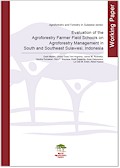| Working Paper Series |
 |
|
| Title | Agroforestry and Forestry in Sulawesi series: Evaluation of the Agroforestry Farmer Field Schools on agroforestry management in South and Southeast Sulawesi, Indonesia | | Author | Endri Martini, Ummu Saad, Yeni Angreiny, James M Roshetko, Hendra Gunawan, Heru T. Maulana, Gusti Suganda, Gusti Dwipayana, La Ode Muhammad Erwin and Abdul Hadedi | | Year | 2016 | | Publisher | World Agroforestry Centre (ICRAF) Southeast Asia Regional Program | | City of Publication | Bogor, Indonesia | | Series Number | Working paper 220 | | Number of Pages | 16 | | Call Number | WP0190-16 | | Keywords | Agroforestry Farmer Field School, evaluation, coffee, durian, cacao, pepper, clove |
|
| Abstract: |
| The Agroforestry Farmer Field School (AFFS) is a program implemented through the
Agroforestry and Forestry: Linking Knowledge to Action (AgFor) project that seeks to
improve the agroforestry garden management capacity of smallholder farmers in several
provinces of Sulawesi Island, Indonesia. In principle, the method implemented in AFFS
follows the participatory concept of farmer field schools, with the AFFS design based on the
local context of AgFor sites in South and Southeast Sulawesi provinces. The AFFS was
implemented from April 2013 to March 2014, with a focus on five main commodities
prioritized by farmer partners, that is, pepper, clove, coffee, cacao and durian. Experts and
scientists from Indonesian national research institutes were engaged as resource persons in the
AFFS. One year after the program initiation, an evaluation was conducted through interviews
of randomly-selected AFFS participants from four districts in South and Southeast Sulawesi
provinces. The evaluation was conducted from April to July 2014 with 263 respondents (12%
of total AFFS participants). Results of the evaluation showed that 97% of the respondents
gained benefit from attending AFFS. New and reliable knowledge or information was
perceived as the most important aspect motivating farmers to attend AFFS. Results showed
that one year after first implementation of AFFS, 14% of respondents had generated cash
benefits from testing new knowledge learned during AFFS. The amount of money generated
depended on the type of knowledge tested. Fertilizing and pruning were important techniques
that yielded cash benefits for farmers in the short term (within one year). The evaluation
concluded that after AFFS activities end, a minimum of one year of facilitation would be
required to assist participants to effectively test and adapt the new knowledge learned |
|
|
Download file(s): Click icon to download/open file.
|
| |
File Size |
Description |

|
1,020 KB |
Softcopy |
|
|
|
| Viewed in 334 times. Downloaded in 333 times. |